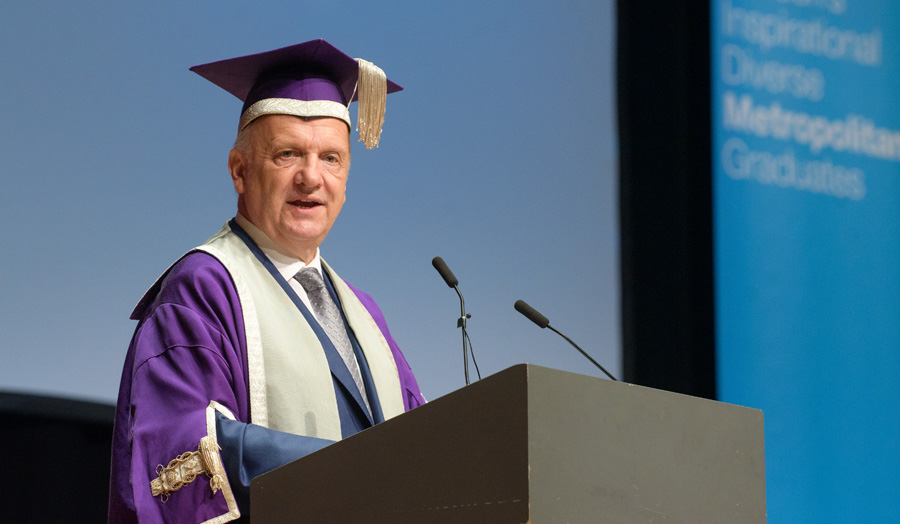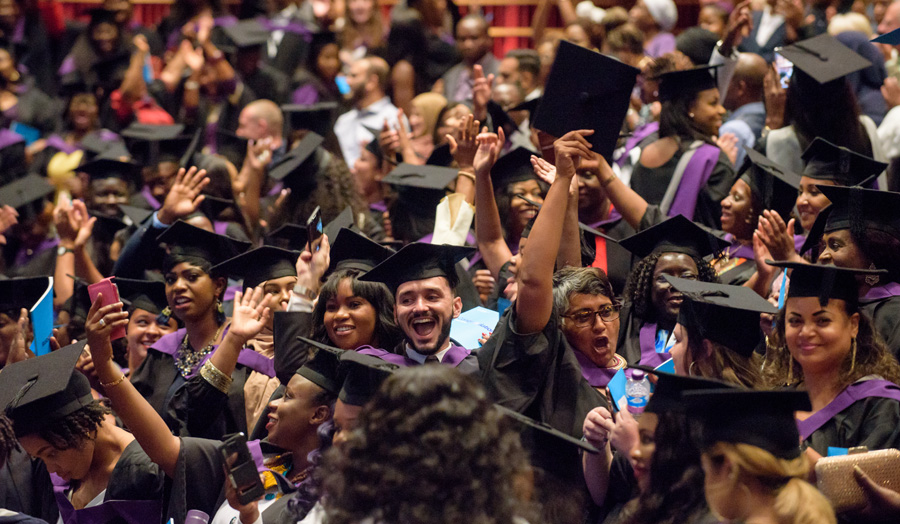Read Professor John Raftery's, Vice-Chancellor of London Met, speech which was given at the summer 2018 graduation ceremonies.
Date: 16 August 2018
Eminent guests, graduates and families, colleagues and friends of London Met, I welcome you all to this graduation ceremony. We are here today to acknowledge the great work you have done, to honour you with warm congratulations, and to send you on your way to the next steps in your life with the blessings and good wishes of the London Met Community.
Graduates, each one of you is here today through your own sustained hard work. You have needed courage to face the challenges of university learning. You have needed to develop certain qualities of character and mind to achieve this. These qualities include empathy, rigour, the capacity to think independently, to listen politely, and, when necessary,’ to disagree, without being disagreeable’.
With these qualities you are empowered to seek out new opportunities with the confidence that you can contribute, with the knowledge that you are ready, that you can overcome challenges and unexpected setbacks. That’s the power of a University education.
One of the great joys of working and studying in a university is that you get to work with the very best people. Because we work with books, written materials and documents, we get to work with - and to study - both the living and the dead! Let me explain, with two examples, the first from 2000 years ago, and the second from just three weeks ago.
In her Commencement address at Harvard, the author JK Rowling took the students back two thousand years ago to Rome, where lived a man named Seneca. Seneca wrote about the great benefit of having a higher purpose. That is, a purpose beyond short term transaction or personal advancement. For example, in our personal lives, being a parent is about much more than paying the bills (although that helps), it is about the many acts of love and sacrifice it takes to raise and educate a new human being. This, having a higher purpose, is what we mean by ‘living well’ or living a ‘good life’.
Seneca said about life, “it is not about how long it is but how good it is”.
Over the years since 1848, and the founding of this institution, some graduating classes have found themselves here in relatively easy times, others have graduated in times of extraordinary difficulty, during wars and recessions. Those graduates were called on to special and unselfish kinds of sacrifice, some fought and died for their country, others faced years of recession and challenges to find meaningful and well-paid work. Today we are in, not the worst, but also perhaps, not the very best, of times. You graduate today at a time of considerable uncertainty as this country faces its biggest challenge in decades, with a polarised politics, and, it must be said, a currently diminishing influence in world affairs. There is also at present an increased volume, from those shouting for attention from the extreme edges. Currently we seem divided almost equally between two opposing - and fervently held - views of the world. As we look across the Atlantic and around Europe we see similar growing divisions between what we might call “competing certitudes”. In the midst of this it is important that we stay faithful to our passion for deepening understanding about both the present and the future and seeking to resolve non-trivial problems.
Do not be discouraged by current passing difficulties, but keep a sense of perspective, on the huge advances we have made. Today we are living longer, healthier lives, adult literacy has never been higher, infant mortality never lower. We have in the world today, fewer people in absolute poverty than ever before and there has never been a bigger proportion of the population with access to information and education and who can make it all the way to university. In short, there has never been a better time to live.
But, it is progress and not perfection. Remember too that there are countries today in 2018 where failures of leadership mean for example that infant mortality and malnutrition have risen. There is a great need for compassionate leadership and responsible active citizenship.
In my second example, some 26 million of us saw Gareth Southgate, the England football coach at the 2018 World Cup, give an inspirational masterclass on compassionate - and highly effective - leadership. Seneca would have been proud of Southgate who, as his own players were celebrating their victory in an important game against Sweden, went over to sympathise with the crestfallen, distraught players of the team who had been beaten that day. Leadership sets a tone. Leadership should set a high standard, to which we can all aspire.
As you graduate now, in 2018, you have the opportunity to do your part, to help create a better future for your families, a better future for your communities, and, a better future for your country.
The theologian Reinhold Niebuhr wrote in 1944, “Man’s capacity for justice makes democracy possible, but man’s inclination to injustice makes democracy necessary.”
The American historian John Meacham put it like this, “We try, we fail, we try again. For only through such trials is progress possible.”
Big and significant achievements, are usually not made by individuals on their own but are made by people working together, it was so with the England football team and so it is with a University degree. You have collaborators, friends, family. They may have given you courage when you were facing fears, or helped you ‘pick yourself up’ after a setback, or maybe they were earning and paying the bills while you were a student. So, I acknowledge, and thank those who are with you today, at the front and in the balcony - your supporters, friends, families, and also my colleagues sharing this platform with me, all of whom have played some part in helping you to be here today celebrating your achievement.
And now dear Graduates, in these last few minutes, let us take a quiet moment to reflect. I invite you to ask yourself, what is my core purpose? Now, try to look ahead to 20 years from now. Ask yourself two questions;
- "When my story is written, what would I like people to say?"
- "What will be my contribution to my family, to my community, to my profession and to the world around me?"
Graduates, we have endeavoured to bring you on a journey of experiences which help you to grow and transform. The whole University celebrates with you. We are proud of your achievements. But there is much more to do, and today marks a new beginning. In conclusion, I call each of you to action, to go out from here, with confidence, with our blessings and best wishes, and work actively towards living a good and generous life.
Follow Professor Raftery on twitter: @johnjraftery


